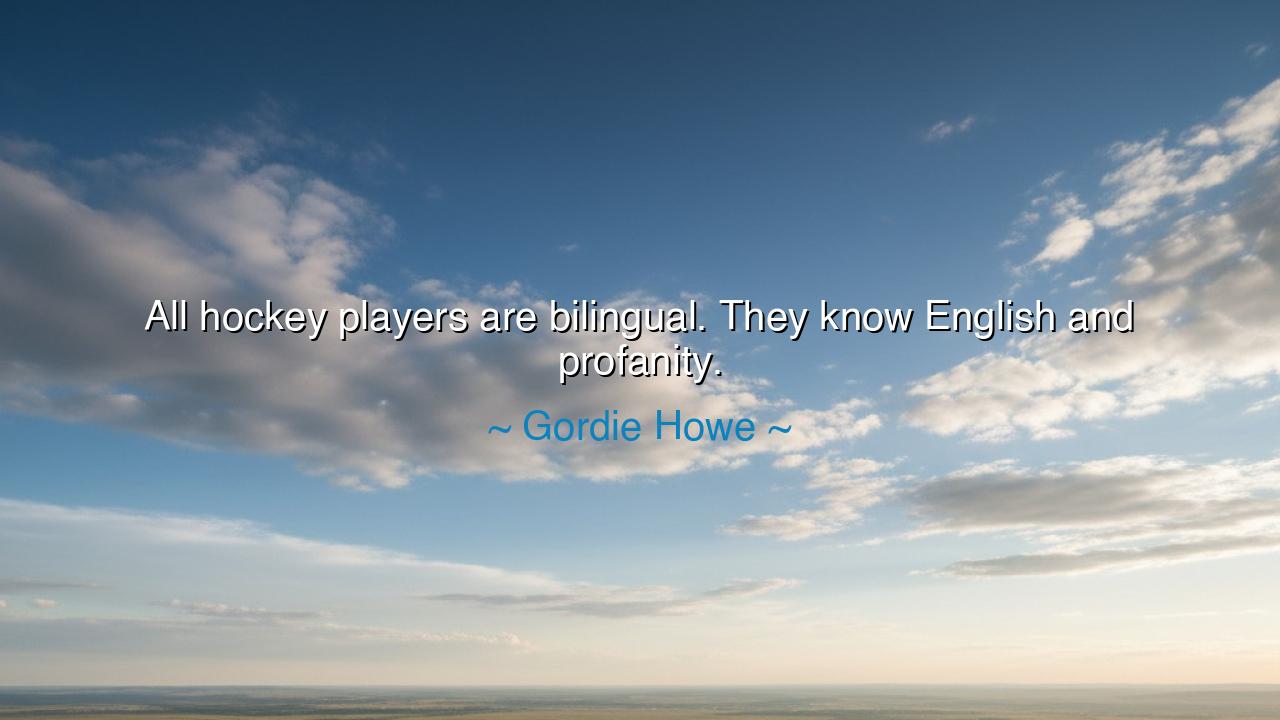
All hockey players are bilingual. They know English and






In the frozen arenas where steel meets ice and warriors clash in speed and fury, the voice of Gordie Howe, the elder statesman of hockey, rose with humor and truth. He declared with a twinkle in his eye: “All hockey players are bilingual. They know English and profanity.” Though spoken in jest, these words echo with deeper meaning, for they unveil not only the nature of hockey, but the timeless law of passion, struggle, and the language of battle.
For in the game of hockey, words are not ornamental but primal. The skater’s body speaks in collisions, his stick in strikes, his lungs in roars of defiance or pain. Amidst such chaos, the tongue finds few adornments—only the bluntness of command, the sharpness of taunt, or the cry of rage. Howe’s words remind us that profanity, raw and unpolished, springs not from vulgarity alone, but from the intensity of men striving with every sinew to overcome. In this sense, profanity is the battle-cry of the rink, as natural to the player as sweat and blood.
The ancients themselves knew such language. In the heat of Thermopylae, as Leonidas and his three hundred faced the armies of Persia, it was not flowery speeches that passed between shields, but sharp commands and defiant shouts. The words were harsh, stripped of poetry, yet they burned with spirit. So too in hockey: when the body strains and the heart pounds, language is pared down to its core—sometimes noble, sometimes coarse, but always real.
Yet Howe’s jest also holds within it humility. By saying all hockey players are “bilingual,” he laughs at himself and his brethren, confessing that in the throes of conflict, even the most disciplined may break into rough words. It is not refinement that wins the puck, but grit. And grit does not always speak in polite syllables. Howe, known as “Mr. Hockey,” understood that greatness was not prettiness, but honesty—the honesty of effort, of struggle, and yes, sometimes of unrefined speech.
We see this truth reflected in Howe’s own life. Known for his unmatched skill and toughness, he was feared and respected across decades. Yet his legacy was not only in goals scored but in his authenticity. He did not pretend that the game was genteel; he acknowledged its rawness. His humor, captured in this quote, invites us to see hockey not as polished spectacle alone, but as the real, unvarnished fight that it is. In admitting the players’ “second language,” he gave dignity even to their flaws, for they were born of passion.
The lesson is not that we should embrace profanity, but that we should embrace authenticity. In our struggles—whether in sport, work, or life—we will not always speak with elegance. At times, our language will be sharp, our tempers raw, our expressions rough. What matters is not the polish of our words, but the truth of our striving. Howe’s wit teaches us that imperfection in speech is forgivable when it arises from dedication, from the heart’s full engagement in the contest of life.
So let these words of Gordie Howe be remembered: “All hockey players are bilingual. They know English and profanity.” Do not mistake them as mockery of the game, but as celebration of its raw humanity. For in the clash of sticks and the blur of skates, men reveal themselves as they are—not always polished, but always true. And in your own life, do not fear imperfection of expression; rather, fear the absence of passion. Better to speak coarsely with fire in your soul than to speak finely with nothing at stake. For the language of struggle, however rough, is the language of life.






AAdministratorAdministrator
Welcome, honored guests. Please leave a comment, we will respond soon